168 start with H start with H
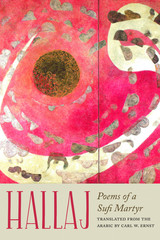
Winner of the Global Humanities Translation Prize
Hallaj is the first authoritative translation of the Arabic poetry of Husayn ibn Mansur al-Hallaj, an early Sufi mystic. Despite his execution in Baghdad in 922 and the subsequent suppression of his work, Hallaj left an enduring literary and spiritual legacy that continues to inspire readers around the world. In Hallaj, Carl W. Ernst offers a definitive collection of 117 of Hallaj’s poems expertly translated for contemporary readers interested in Middle Eastern and Sufi poetry and spirituality.
Ernst’s fresh and direct translations reveal Hallaj’s wide range of themes and genres, from courtly love poems to metaphysical reflections on union with God. In a fascinating introduction, Ernst traces Hallaj’s dramatic story within classical Islamic civilization and early Arabic Sufi poetry. Setting himself apart by revealing Sufi secrets to the world, Hallaj was both celebrated and condemned for declaring: “I am the Truth.”
Expressing lyrics and ideas still heard in popular songs, the works of Hallaj remain vital and fresh even a thousand years after their composition. They reveal him as a master of spiritual poetry centuries before Rumi, who regarded Hallaj as a model. This unique collection makes it possible to appreciate the poems on their own, as part of the tragic legend of Hallaj, and as a formidable legacy of Middle Eastern culture.
The Global Humanities Translation Prize is awarded annually to a previously unpublished translation that strikes the delicate balance between scholarly rigor, aesthetic grace, and general readability, as judged by a rotating committee of Northwestern faculty, distinguished international scholars, writers, and public intellectuals. The Prize is organized by the Global Humanities Initiative, which is jointly supported by Northwestern University’s Buffett Institute for Global Studies and Kaplan Institute for the Humanities.
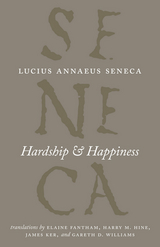
Hardship and Happiness collects a range of essays intended to instruct, from consolations—works that offer comfort to someone who has suffered a personal loss—to pieces on how to achieve happiness or tranquility in the face of a difficult world. Expertly translated, the essays will be read and used by undergraduate philosophy students and experienced scholars alike.

This volume celebrates 100 years of Harvard Studies in Classical Philology. It contains essays by Harvard faculty, emeriti, currently enrolled graduate students, and most recent Ph.D.s. It displays the range and diversity of the study of the Classics at Harvard at the beginning of the twenty-first century.
Volume 100 includes: E. Badian, “Darius III”; D. R. Shackleton Bailey, “On Statius’ Thebaid”; Brian W. Breed, “Silenus and the Imago Vocis in Eclogue 6”; Wendell Clausen, “Propertius 2.32.35–36”; Kathleen Coleman, “Missio at Halicarnassus”; Stamatia Dova, “Who Is μακάρτατος in the Odyssey?”; Casey Dué, “Tragic History and Barbarian Speech in Sallust’s Jugurtha”; John Duffy and Dimiter Angelov, “Observations on a Byzantine Manuscript in Harvard College Library”; Mary Ebbott, “The List of the War Dead in Aeschylus’ Persians”; Gloria Ferrari, “The Ilioupersis in Athens”; José González, “Musai Hypophetores: Apollonius of Rhodes on Inspiration and Interpretation”; Albert Henrichs, “Drama and Dromena: Bloodshed, Violence, and Sacrificial Metaphor in Euripides”; Alexander Hollmann, “Epos as Authoritative Speech in Herodotos’ Histories”; Thomas E. Jenkins, “The Writing in (and of) Ovid’s Byblis Episode”; Christopher Jones, “Nero Speaking”; Prudence Jones, “Juvenal, the Niphates, and Trajan’s Column (Satire 6.407–412)”; Leah J. Kronenberg, “The Poet’s Fiction: Virgil’s Praise of the Farmer, Philosopher, and Poet at the End of Georgics 2”; Olga Levaniouk, “Aithôn, Aithon, and Odysseus”; Nino Luraghi, “Author and Audience in Thucydides’ Archaeology. Some Reflections”; Gregory Nagy, “‘Dream of a Shade’: Refractions of Epic Vision in Pindar’s Pythian 8 and Aeschylus’ Seven against Thebes”; Corinne Ondine Pache, “War Games: Odysseus at Troy”; David Petrain, “Hylas and Silva: Etymological Wordplay in Propertius 1.20”; Timothy Power, “The Parthenoi of Bacchylides 13”; Eric Robinson, “Democracy in Syracuse, 466–412 B.C.”; Charles Segal, “The Oracles of Sophocles’ Trachiniae: Convergence or Confusion?”; Zeph Stewart, “Plautus’ Amphitruo: Three Problems”; Sarolta A. Takàcs, “Politics and Religion in the Bacchanalian Affair of 186 B.C.E.”; R. J. Tarrant, “The Soldier in the Garden and Other Intruders in Ovid’s Metamorphoses”; Richard F. Thomas, “A Trope by Any Other Name: ‘Polysemy,’ Ambiguity, and Significatio in Virgil”; Michael A. Tueller, “Well-Read Heroes Quoting the Aetia in Aeneid 8”; and Calvert Watkins, “A Distant Anatolian Echo in Pindar: The Origin of the Aegis Again.”







































This volume of eighteen articles offers: Andrew R. Dyck, “The Fragments of Heliodorus Homericus”; Hayden Pelliccia, “Aeschylus, Eumenides 64–88 and the Ex Cathedra Language of Apollo”; G. Zuntz, “Aeschyli Prometheus”; Georgia Ann Machemer, “Medicine, Music, and Magic: The Healing Grace of Pindar’s Fourth Nemean”; Carlo O. Pavese, “On Pindar fr. 169”; Deborah Steiner, “Pindar’s ‘Oggetti Parlanti’”; Heinz-Günther Nesselrath, “Parody and Later Greek Comedy”; Noel Robertson, “Athens’ Festival of the New Wine”; Richard F. Thomas, “Two Problems in Theocritus (Id. 5.49, 22.66)”; Nita Krevans, “Ilia’s Dream: Ennius, Virgil, and the Mythology of Seduction”; Benjamin Victor, “Remarks on the Andria of Terence”; Cynthia Damon, “Comm. Pet. 10”; Harold Gotoff, “Oratory: The Art of Illusion”; Henri J. W. Wijsman, “Ascanius, Gargara and Female Power in Georgics 3.269–270”*; Robert V. Albis, “Aeneid 2.57–59: The Ennian Background”; Mario Geymonat, “Callimachus at the End of Aeneas’ Narration”; Alessandro Barchiesi, “Future Reflexive: Two Modes of Allusion and Ovid’s Heroides”; and Monika Asztalos, “Boethius as a Transmitter of Greek Logic to the Latin West: The Categories.”
* By misunderstanding this article was published in an uncorrected form in HSCP, vol. 94 (1992). Any reference should be made to the article as published here.


Volume 97 of Harvard Studies in Classical Philology is a special issue, entitled “Greece in Rome,” comprising revised versions of papers presented at a Loeb Classical Conference on the question of the Greek influence on Roman culture, with a particular though not exclusive emphasis on the Augustan period. The papers reflect the complexity of the relationship between the cultures involved—Greek, Roman, and Italic—and span many fields: history, literature, philosophy, linguistics, religion, and the visual arts.
Contributors include: G. W. Bowersock, “The Barbarism of the Greeks”; John Scheid, “Graeco Ritu: A Typically Roman Way of Honoring the Gods”; Calvert Watkins, “Greece in Italy outside Rome”; Gisela Striker, “Cicero and Greek Philosophy”; Brad Inwood, “Seneca in His Philosophical Milieu”; Bettina Bergmann, “Greek Masterpieces and Roman Recreative Fictions”; Elaine K. Gazda, “Roman Sculpture and the Ethos of Emulation: Reconsidering Repetition”; Ann Kuttner, “Republican Rome Looks at Pergamon”; Cynthia Damon, “Greek Parasites and Roman Patronage”; Richard F. Thomas, “Vestigia Ruris: Urbane Rusticity in Virgil’s Georgics”; R. J. Tarrant, “Greek and Roman in Seneca’s Tragedies”; Christopher P. Jones, “Graia Pandetur ab Urbe”; Albert Henrichs, “Graecia Capta: Roman Views of Greek Culture”; and Sarolta A. Takács, “Alexandria in Rome.”


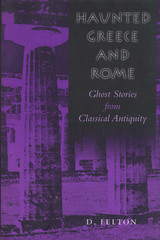
Stories of ghostly spirits who return to this world to warn of danger, to prophesy, to take revenge, to request proper burial, or to comfort the living fascinated people in ancient times just as they do today. In this innovative, interdisciplinary study, the author combines a modern folkloric perspective with literary analysis of ghost stories from classical antiquity to shed new light on the stories' folk roots.
The author begins by examining ancient Greek and Roman beliefs about death and the departed and the various kinds of ghost stories which arose from these beliefs. She then focuses on the longer stories of Plautus, Pliny, and Lucian, which concern haunted houses. Her analysis illuminates the oral and literary transmission and adaptation of folkloric motifs and the development of the ghost story as a literary form. In her concluding chapter, the author also traces the influence of ancient ghost stories on modern ghost story writers, a topic that will interest all readers and scholars of tales of hauntings.

The premier scholar-poet of the Hellenistic age.
Callimachus (ca. 303–ca. 235 BC), a proud and well-born native of Cyrene in Libya, came as a young man to the court of the Ptolemies at Alexandria, where he composed poetry for the royal family; helped establish the Library and Museum as a world center of literature, science, and scholarship; and wrote an estimated 800 volumes of poetry and prose on an astounding variety of subjects, including the Pinakes, a descriptive bibliography of the Library’s holdings in 120 volumes. Callimachus’ vast learning richly informs his poetry, which ranges broadly and reworks the language and generic properties of his predecessors in inventive, refined, and expressive ways. The “Callimachean” style, combining learning, elegance, and innovation and prizing brevity, clarity, lightness, and charm, served as an important model for later poets, not least at Rome for Catullus, Virgil, Horace, Ovid, and the elegists, among others.
This edition, which replaces the earlier Loeb editions by A. W. Mair (1921) and C. A. Trypanis (1954, 1958), presents all that currently survives of and about Callimachus and his works, including the ancient commentaries (Diegeseis) and scholia. Volume I contains Aetia, Iambi, and lyric poems; Volume II Hecale, Hymns, and Epigrams; and Volume III miscellaneous epics and elegies, other fragments, and testimonia, together with concordances and a general index. The Greek text is based mainly on Pfeiffer’s but enriched by subsequently published papyri and the judgment of later editors, and its notes and annotation are fully informed by current scholarship.
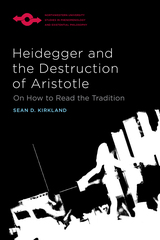
A bold new conception of Heidegger’s project of Destruktion as a method of interpreting history
For Martin Heidegger, our inherited traditions provide the concepts through which we make our world intelligible. Concepts we can also oppose, disrupt, and even exceed. First, however, if Western philosophy is our inheritance, we must submit it to Destruktion—starting with Aristotle. Heidegger and the Destruction of Aristotle: On How to Read the Tradition presents a new conception of Heidegger’s “destruction” as a way of reading.
Situated between Nietzschean genealogy and Derridean deconstruction, this method uncovers in Aristotle the most vital originating articulations of the Western tradition and gives us the means to confront it. Sean D. Kirkland argues this is not a rejection of the past but a sophisticated and indeed timely hermeneutic tool—a complex, illuminating, and powerful method for interpreting historical texts at our present moment. Acknowledging the historical Heidegger as a politically compromised and still divisive figure, Kirkland demonstrates that Heideggerian destruction is a method of interpreting history that enables us to reorient and indeed transform its own most troubling legacies.
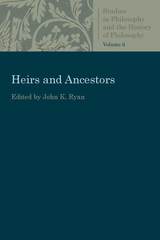

Three plays by ancient Greece’s third great tragedian.
One of antiquity's greatest poets, Euripides has been prized in every age for the pathos, terror, and intellectual probing of his dramatic creations. The new Loeb Classical Library edition of his plays is in six volumes.
Helen, in Volume V, employs an alternative history in which a virtuous and faithful Helen was falsely blamed for the actions of her divinely created double in Troy. Here too are Phoenician Women, the battle between the sons of Oedipus for control of Thebes; and Orestes, recasting Orestes' lot after he murdered his mother.

A continuation of Thucydides.
Xenophon (ca. 430 to ca. 354 BC) was a wealthy Athenian and friend of Socrates. He left Athens in 401 and joined an expedition including ten thousand Greeks led by the Persian governor Cyrus against the Persian king. After the defeat of Cyrus, it fell to Xenophon to lead the Greeks from the gates of Babylon back to the coast through inhospitable lands. Later he wrote the famous vivid account of this “March Up-Country” (Anabasis); but meanwhile he entered service under the Spartans against the Persian king, married happily, and joined the staff of the Spartan king, Agesilaus. But Athens was at war with Sparta in 394 and so exiled Xenophon. The Spartans gave him an estate near Elis where he lived for years writing and hunting and educating his sons. Reconciled to Sparta, Athens restored Xenophon to honor, but he preferred to retire to Corinth.
Xenophon’s Anabasis is a true story of remarkable adventures. Hellenica, a history of Greek affairs from 411 to 362, begins as a continuation of Thucydides’ account. There are four works on Socrates (collected in LCL 168). In Memorabilia Xenophon adds to Plato’s picture of Socrates from a different viewpoint. The Apology is an interesting complement to Plato’s account of Socrates’ defense at his trial. Xenophon’s Symposium portrays a dinner party at which Socrates speaks of love; and Oeconomicus has him giving advice on household management and married life. Cyropaedia, a historical romance on the education of Cyrus (the Elder), reflects Xenophon’s ideas about rulers and government; the Loeb edition is in two volumes.
We also have his Hiero, a dialogue on government; Agesilaus, in praise of that king; Constitution of Lacedaemon (on the Spartan system); Ways and Means (on the finances of Athens); Manual for a Cavalry Commander; a good manual of Horsemanship; and a lively Hunting with Hounds. The Constitution of the Athenians, though clearly not by Xenophon, is an interesting document on politics at Athens. These eight books are collected in the last of the seven volumes of the Loeb Classical Library edition of Xenophon.

A continuation of Thucydides.
Xenophon (ca. 430 to ca. 354 BC) was a wealthy Athenian and friend of Socrates. He left Athens in 401 and joined an expedition including ten thousand Greeks led by the Persian governor Cyrus against the Persian king. After the defeat of Cyrus, it fell to Xenophon to lead the Greeks from the gates of Babylon back to the coast through inhospitable lands. Later he wrote the famous vivid account of this “March Up-Country” (Anabasis); but meanwhile he entered service under the Spartans against the Persian king, married happily, and joined the staff of the Spartan king, Agesilaus. But Athens was at war with Sparta in 394 and so exiled Xenophon. The Spartans gave him an estate near Elis where he lived for years writing and hunting and educating his sons. Reconciled to Sparta, Athens restored Xenophon to honor, but he preferred to retire to Corinth.
Xenophon’s Anabasis is a true story of remarkable adventures. Hellenica, a history of Greek affairs from 411 to 362, begins as a continuation of Thucydides’ account. There are four works on Socrates (collected in LCL 168). In Memorabilia Xenophon adds to Plato’s picture of Socrates from a different viewpoint. The Apology is an interesting complement to Plato’s account of Socrates’ defense at his trial. Xenophon’s Symposium portrays a dinner party at which Socrates speaks of love; and Oeconomicus has him giving advice on household management and married life. Cyropaedia, a historical romance on the education of Cyrus (the Elder), reflects Xenophon’s ideas about rulers and government; the Loeb edition is in two volumes.
We also have his Hiero, a dialogue on government; Agesilaus, in praise of that king; Constitution of Lacedaemon (on the Spartan system); Ways and Means (on the finances of Athens); Manual for a Cavalry Commander; a good manual of Horsemanship; and a lively Hunting with Hounds. The Constitution of the Athenians, though clearly not by Xenophon, is an interesting document on politics at Athens. These eight books are collected in the last of the seven volumes of the Loeb Classical Library edition of Xenophon.

A miscellany of learned literature from Alexandria and beyond.
This volume presents a selection of Hellenistic prose and poetry, ranging chronologically from Philitas of Cos through Alexander of Aetolia and Hermesianax of Colophon to Euphorion of Chalcis and Parthenius of Nicaea, whose mythography Sufferings in Love is the major work in the collection. Knowledge of many of these texts has been increased by papyrological discoveries in the last century, yet few of them have appeared in English translation before now. Taken together, these works represent the geographic and stylistic range of a rich and inventive period in Classical literature.

An introduction to koine Greek and Hellenistic culture and religion, a selected bibliography, brief prefaces to the selections, and a complete vocabulary are also included in this volume.

An accomplished poet and classical scholar, Barbara Hughes Fowler brings Hellenistic poetry to life for the contemporary reader. Her selections engage us with the full range of Hellenistic poetic genres, styles, themes, and moods. The anthology includes Fowler’s new translation of the entire Argonautica of Apollonius of Rhodes, and eight of Theocritus’ Idylls, including the beautiful, sensuous description of late summer in Idyll VII and the shrewdly comical description of two young matrons venturing into the noisy streets of Alexandria in Idyll XV. There are translations of four hymns of Callimachus, as well as poems by Aratus, Bion, Herodas, Moschus, Pseudo-Moschus, and a substantial selection from the Greek Anthology.
An ideal companion to her recently published book, The Hellenistic Aesthetic, Barbara Fowler’s Hellenistic Poetry is both a major contribution to classical studies and an invitation to all interested readers to discover the beauty and richness of Hellenistic poetry.
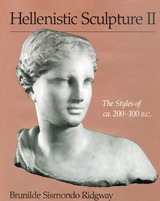
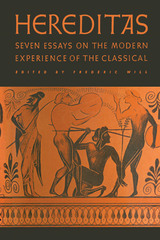
Is Ancient Greece still meaningful to the twenty-first-century world? The vitality of the classical tradition, which has been a long-enduring and important element in our culture, is the concern of the seven scholars who in this book present their answers to this question.
In various ways their essays support editor Frederic Will's statement that the "complex and mature group of awarenesses" embodied in the classical tradition still help to maintain the continuity of human culture, thus sharing in the unbroken process of developing a Western civilization. These awarenesses are not self-perpetuating but must be sustained by the guardians of tradition—schools, literary creators and critics, libraries, and scholars. In this book, particular attention is devoted to the literary creators. In discussing the impact of Greek myth, Greek literature, and Greek philosophy on modern writers, the present essayists try to determine how alive Greek classical culture is today, how meaningful it is, and how it can be perpetuated. Through their presentations in these seven essays, the contributors prove that the tradition does not suffer from lack of able guardians.
These studies in the interpretation of literature and thought afford stimulating evidence that the classical tradition is still alive in our modern age.
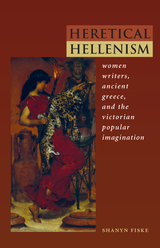
The prevailing assumption regarding the Victorians’ relationship to ancient Greece is that Greek knowledge constituted an exclusive discourse within elite male domains. Heretical Hellenism: Women Writers, Ancient Greece, and the Victorian Popular Imagination challenges that theory and argues that while the information women received from popular sources was fragmentary and often fostered intellectual insecurities, it was precisely the ineffability of the Greek world refracted through popular sources and reconceived through new fields of study that appealed to women writers’ imaginations.
Examining underconsidered sources such as theater history and popular journals, Shanyn Fiske uncovers the many ways that women acquired knowledge of Greek literature, history, and philosophy without formal classical training. Through discussions of women writers such as Charlotte Brontë, George Eliot, and Jane Harrison, Heretical Hellenism demonstrates that women established the foundations of a heretical challenge to traditional humanist assumptions about the uniformity of classical knowledge and about women’s place in literary history.
Heretical Hellenism provides a historical rationale for a more expansive definition of classical knowledge and offers an interdisciplinary method for understanding the place of classics both in the nineteenth century and in our own time.

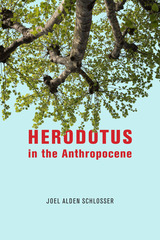
Schlosser shows that the Histories, which chronicle the interactions among the Greek city-states and their neighbors that culminated in the Persian Wars, illuminate a telling paradox: at those times when humans appear capable of exerting more influence than ever before, they must also assert collective agency to avoid their own downfall. Here, success depends on nomoi, or the culture, customs, and laws that organize human communities and make them adaptable through cooperation. Nomoi arise through sustained contact between humans and their surroundings and function best when practiced willingly and with the support of strong commitments to the equality of all participants. Thus, nomoi are the very substance of political agency and, ultimately, the key to freedom and ecological survival because they guide communities to work together to respond to challenges. An ingenious contribution to political theory, political philosophy, and ecology, Herodotus in the Anthropocene reminds us that the best perspective on the present can often be gained through the lens of the past.

How to cultivate Greek heroes and athletes.
In the writings of Philostratus (ca. AD 170-ca. 250), the renaissance of Greek literature in the second century AD reached its height. His Life of Apollonius of Tyana, Lives of the Sophists, and Imagines reconceive in different ways Greek religion, philosophy, and art in and for the world of the Roman Empire. In this volume, Heroicus and Gymnasticus, two works of equal creativity and sophistication, together with two brief Discourses (Dialexeis), complete the Loeb edition of his writings.
Heroicus is a conversation in a vineyard amid ruins of the Protesilaus shrine (opposite Troy on the Hellespont), between a wise and devout vinedresser and an initially skeptical Phoenician sailor, about the beauty, continuing powers, and worship of the Homeric heroes. With information from his local hero, the vinedresser reveals unknown stories of the Trojan campaign especially featuring Protesilaus and Palamedes, and describes complex, miraculous, and violent rituals in the cults of Achilles.
Gymnasticus is the sole surviving ancient treatise on sports. It reshapes conventional ideas about the athletic body and expertise of the athletic trainer and also explores the history of the Olympic Games and other major Greek athletic festivals, portraying them as distinctive venues for the display of knowledge.

Two early works by the consummate Latin love poet.
Ovid (Publius Ovidius Naso, 43 BC–AD 17), born at Sulmo, studied rhetoric and law at Rome. Later he did considerable public service there, and otherwise devoted himself to poetry and to society. Famous at first, he offended the emperor Augustus by his Ars amatoria, and was banished because of this work and some other reason unknown to us, and dwelt in the cold and primitive town of Tomis on the Black Sea. He continued writing poetry, a kindly man, leading a temperate life. He died in exile.
Ovid's main surviving works are the Metamorphoses, a source of inspiration to artists and poets including Chaucer and Shakespeare; the Fasti, a poetic treatment of the Roman year of which Ovid finished only half; the Amores, love poems; the Ars amatoria, not moral but clever and in parts beautiful; Heroides, fictitious love letters by legendary women to absent husbands; and the dismal works written in exile: the Tristia, appeals to persons including his wife and also the emperor; and similar Epistulae ex Ponto. Poetry came naturally to Ovid, who at his best is lively, graphic and lucid.
The Loeb Classical Library edition of Ovid is in six volumes.

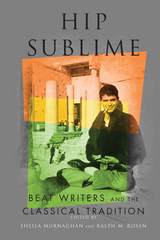
In this volume, a diverse group of contributors explore for the first time the fascinating tensions and paradoxes that arose from interactions between these avant-garde writers and a literary tradition often seen as conservative and culturally hegemonic. With essays that cover the canonical Beat authors—such as Allen Ginsberg, Jack Kerouac, and William Burroughs—along with less well-known figures—including Kenneth Rexroth, Ed Sanders, and Diane di Prima—Hip Sublime: Beat Writers and the Classical Tradition brings long overdue attention to the Beat movement’s formative appropriation of the Greek and Latin classics.

The definitive English edition of the “Father of Medicine.”
This is the first volume in the Loeb Classical Library’s complete edition of Hippocrates’ invaluable texts, which provide essential information about the practice of medicine in antiquity and about Greek theories concerning the human body. Here, Paul Potter presents the Greek text with facing English translation of five treatises that showcase the range of Hippocratic theory, philosophy, and practice: Ancient Medicine; Airs, Waters, Places; Epidemics 1 and 3; Precepts; and Nutriment. Also included is the famous Hippocratic Oath.
This Loeb edition replaces the original by W. H. S. Jones.
The works available in the Loeb Classical Library edition of Hippocrates are:
Volume I: Ancient Medicine. Airs, Waters, Places. Epidemics 1 and 3. The Oath. Precepts. Nutriment.
Volume II: Prognostic. Regimen in Acute Diseases. The Sacred Disease. The Art. Breaths. Law. Decorum. Dentition.
Volume III: On Wounds in the Head. In the Surgery. On Fractures. On Joints. Mochlicon.
Volume IV: Nature of Man. Regimen in Health. Humors. Aphorisms. Regimen 1–3. Dreams.
Volume V: Affections. Diseases 1–2.
Volume VI: Diseases 3. Internal Affections. Regimen in Acute Diseases.
Volume VII: Epidemics 2 and 4–7.
Volume VIII: Places in Man. Glands. Fleshes. Prorrhetic 1–2. Physician. Use of Liquids. Ulcers. Haemorrhoids and Fistulas.
Volume IX: Anatomy. Nature of Bones. Heart. Eight Months’ Child. Coan Prenotions. Crises. Critical Days. Superfetation. Girls. Excision of the Fetus. Sight.
Volume X: Generation. Nature of the Child. Diseases 4. Nature of Women. Barrenness.
Volume XI: Diseases of Women 1–2.
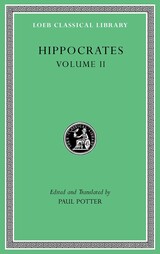
The definitive English edition of the “Father of Medicine.”
This is the second volume in the Loeb Classical Library’s complete edition of Hippocrates’ invaluable texts, which provide essential information about the practice of medicine in antiquity and about Greek theories concerning the human body. The first two treatises, Prognostic and Regimen in Acute Diseases, are manuals respectively on how to predict the course and outcome of acute diseases and how to apply appropriate dietetic measures. Sacred Disease, The Art, and Breaths are rhetorically polished monographs, each arguing in favor of a specific hypothesis: that sacred disease is a misnomer; that medicine is a legitimate art; and that air plays important roles in life and health. Law sketches a new model of medical education; Decorum summarizes a public address on the components of medical wisdom; and Dentition collects pediatric aphorisms dealing mainly with the nursing of infants and ulcerations of their tonsils, uvula, and throat.
This Loeb edition replaces the original by W. H. S. Jones.
The works available in the Loeb Classical Library edition of Hippocrates are:
Volume I: Ancient Medicine. Airs, Waters, Places. Epidemics 1 and 3. The Oath. Precepts. Nutriment.
Volume II: Prognostic. Regimen in Acute Diseases. The Sacred Disease. The Art. Breaths. Law. Decorum. Dentition.
Volume III: On Wounds in the Head. In the Surgery. On Fractures. On Joints. Mochlicon.
Volume IV: Nature of Man. Regimen in Health. Humors. Aphorisms. Regimen 1–3. Dreams.
Volume V: Affections. Diseases 1–2.
Volume VI: Diseases 3. Internal Affections. Regimen in Acute Diseases.
Volume VII: Epidemics 2 and 4–7.
Volume VIII: Places in Man. Glands. Fleshes. Prorrhetic 1–2. Physician. Use of Liquids. Ulcers. Haemorrhoids and Fistulas.
Volume IX: Anatomy. Nature of Bones. Heart. Eight Months’ Child. Coan Prenotions. Crises. Critical Days. Superfetation. Girls. Excision of the Fetus. Sight.
Volume X: Generation. Nature of the Child. Diseases 4. Nature of Women. Barrenness.
Volume XI: Diseases of Women 1–2.

The definitive English edition of the “Father of Medicine.”
Hippocrates, said to have been born in Cos in or before 460 BC, learned medicine and philosophy; traveled widely as a medical doctor and teacher; was consulted by King Perdiccas of Macedon and Artaxerxes of Persia; and died perhaps at Larissa. Apparently he rejected superstition in favor of inductive reasoning and the study of real medicine as subject to natural laws, in general and in individual people as patients for treatment by medicines and surgery. Of the roughly seventy works in the “Hippocratic Collection” many are not by Hippocrates; even the famous oath may not be his. But he was undeniably the “Father of Medicine.”
The works available in the Loeb Classical Library edition of Hippocrates are:
Volume I: Ancient Medicine. Airs, Waters, Places. Epidemics 1 and 3. The Oath. Precepts. Nutriment.
Volume II: Prognostic. Regimen in Acute Diseases. The Sacred Disease. The Art. Breaths. Law. Decorum. Dentition.
Volume III: On Wounds in the Head. In the Surgery. On Fractures. On Joints. Mochlicon.
Volume IV: Nature of Man. Regimen in Health. Humors. Aphorisms. Regimen 1–3. Dreams.
Volume V: Affections. Diseases 1–2.
Volume VI: Diseases 3. Internal Affections. Regimen in Acute Diseases.
Volume VII: Epidemics 2 and 4–7.
Volume VIII: Places in Man. Glands. Fleshes. Prorrhetic 1–2. Physician. Use of Liquids. Ulcers. Haemorrhoids and Fistulas.
Volume IX: Anatomy. Nature of Bones. Heart. Eight Months’ Child. Coan Prenotions. Crises. Critical Days. Superfetation. Girls. Excision of the Fetus. Sight.
Volume X: Generation. Nature of the Child. Diseases 4. Nature of Women. Barrenness.
Volume XI: Diseases of Women 1–2.

The definitive English edition of the “Father of Medicine.”
Hippocrates, said to have been born in Cos in or before 460 BC, learned medicine and philosophy; traveled widely as a medical doctor and teacher; was consulted by King Perdiccas of Macedon and Artaxerxes of Persia; and died perhaps at Larissa. Apparently he rejected superstition in favor of inductive reasoning and the study of real medicine as subject to natural laws, in general and in individual people as patients for treatment by medicines and surgery. Of the roughly seventy works in the “Hippocratic Collection” many are not by Hippocrates; even the famous oath may not be his. But he was undeniably the “Father of Medicine.”
The works available in the Loeb Classical Library edition of Hippocrates are:
Volume I: Ancient Medicine. Airs, Waters, Places. Epidemics 1 and 3. The Oath. Precepts. Nutriment.
Volume II: Prognostic. Regimen in Acute Diseases. The Sacred Disease. The Art. Breaths. Law. Decorum. Dentition.
Volume III: On Wounds in the Head. In the Surgery. On Fractures. On Joints. Mochlicon.
Volume IV: Nature of Man. Regimen in Health. Humors. Aphorisms. Regimen 1–3. Dreams.
Volume V: Affections. Diseases 1–2.
Volume VI: Diseases 3. Internal Affections. Regimen in Acute Diseases.
Volume VII: Epidemics 2 and 4–7.
Volume VIII: Places in Man. Glands. Fleshes. Prorrhetic 1–2. Physician. Use of Liquids. Ulcers. Haemorrhoids and Fistulas.
Volume IX: Anatomy. Nature of Bones. Heart. Eight Months’ Child. Coan Prenotions. Crises. Critical Days. Superfetation. Girls. Excision of the Fetus. Sight.
Volume X: Generation. Nature of the Child. Diseases 4. Nature of Women. Barrenness.
Volume XI: Diseases of Women 1–2.

The definitive English edition of the “Father of Medicine.”
This is the ninth volume in the Loeb Classical Library’s ongoing edition of Hippocrates’ invaluable texts, which provide essential information about the practice of medicine in antiquity and about Greek theories concerning the human body. Here Paul Potter presents the Greek text with facing English translation of eleven treatises, four previously unavailable in English, that illuminate Hippocratic medicine in such areas as anatomy, physiology, prognosis and clinical signs, obstetrics, and ophthalmology.
The works available in the Loeb Classical Library edition of Hippocrates are:
Volume I: Ancient Medicine. Airs, Waters, Places. Epidemics 1 and 3. The Oath. Precepts. Nutriment.
Volume II: Prognostic. Regimen in Acute Diseases. The Sacred Disease. The Art. Breaths. Law. Decorum. Dentition.
Volume III: On Wounds in the Head. In the Surgery. On Fractures. On Joints. Mochlicon.
Volume IV: Nature of Man. Regimen in Health. Humors. Aphorisms. Regimen 1–3. Dreams.
Volume V: Affections. Diseases 1–2.
Volume VI: Diseases 3. Internal Affections. Regimen in Acute Diseases.
Volume VII: Epidemics 2 and 4–7.
Volume VIII: Places in Man. Glands. Fleshes. Prorrhetic 1–2. Physician. Use of Liquids. Ulcers. Haemorrhoids and Fistulas.
Volume IX: Anatomy. Nature of Bones. Heart. Eight Months’ Child. Coan Prenotions. Crises. Critical Days. Superfetation. Girls. Excision of the Fetus. Sight.
Volume X: Generation. Nature of the Child. Diseases 4. Nature of Women. Barrenness.
Volume XI: Diseases of Women 1–2.

The definitive English edition of the “Father of Medicine.”
Hippocrates, said to have been born in Cos in or before 460 BC, learned medicine and philosophy; traveled widely as a medical doctor and teacher; was consulted by King Perdiccas of Macedon and Artaxerxes of Persia; and died perhaps at Larissa. Apparently he rejected superstition in favor of inductive reasoning and the study of real medicine as subject to natural laws, in general and in individual people as patients for treatment by medicines and surgery. Of the roughly seventy works in the “Hippocratic Collection” many are not by Hippocrates; even the famous oath may not be his. But he was undeniably the “Father of Medicine.”
The works available in the Loeb Classical Library edition of Hippocrates are:
Volume I: Ancient Medicine. Airs, Waters, Places. Epidemics 1 and 3. The Oath. Precepts. Nutriment.
Volume II: Prognostic. Regimen in Acute Diseases. The Sacred Disease. The Art. Breaths. Law. Decorum. Dentition.
Volume III: On Wounds in the Head. In the Surgery. On Fractures. On Joints. Mochlicon.
Volume IV: Nature of Man. Regimen in Health. Humors. Aphorisms. Regimen 1–3. Dreams.
Volume V: Affections. Diseases 1–2.
Volume VI: Diseases 3. Internal Affections. Regimen in Acute Diseases.
Volume VII: Epidemics 2 and 4–7.
Volume VIII: Places in Man. Glands. Fleshes. Prorrhetic 1–2. Physician. Use of Liquids. Ulcers. Haemorrhoids and Fistulas.
Volume IX: Anatomy. Nature of Bones. Heart. Eight Months’ Child. Coan Prenotions. Crises. Critical Days. Superfetation. Girls. Excision of the Fetus. Sight.
Volume X: Generation. Nature of the Child. Diseases 4. Nature of Women. Barrenness.
Volume XI: Diseases of Women 1–2.

The definitive English edition of the “Father of Medicine.”
Hippocrates, said to have been born in Cos in or before 460 BC, learned medicine and philosophy; traveled widely as a medical doctor and teacher; was consulted by King Perdiccas of Macedon and Artaxerxes of Persia; and died perhaps at Larissa. Apparently he rejected superstition in favor of inductive reasoning and the study of real medicine as subject to natural laws, in general and in individual people as patients for treatment by medicines and surgery. Of the roughly seventy works in the “Hippocratic Collection” many are not by Hippocrates; even the famous oath may not be his. But he was undeniably the “Father of Medicine.”
The works available in the Loeb Classical Library edition of Hippocrates are:
Volume I: Ancient Medicine. Airs, Waters, Places. Epidemics 1 and 3. The Oath. Precepts. Nutriment.
Volume II: Prognostic. Regimen in Acute Diseases. The Sacred Disease. The Art. Breaths. Law. Decorum. Dentition.
Volume III: On Wounds in the Head. In the Surgery. On Fractures. On Joints. Mochlicon.
Volume IV: Nature of Man. Regimen in Health. Humors. Aphorisms. Regimen 1–3. Dreams.
Volume V: Affections. Diseases 1–2.
Volume VI: Diseases 3. Internal Affections. Regimen in Acute Diseases.
Volume VII: Epidemics 2 and 4–7.
Volume VIII: Places in Man. Glands. Fleshes. Prorrhetic 1–2. Physician. Use of Liquids. Ulcers. Haemorrhoids and Fistulas.
Volume IX: Anatomy. Nature of Bones. Heart. Eight Months’ Child. Coan Prenotions. Crises. Critical Days. Superfetation. Girls. Excision of the Fetus. Sight.
Volume X: Generation. Nature of the Child. Diseases 4. Nature of Women. Barrenness.
Volume XI: Diseases of Women 1–2.

The definitive English edition of the “Father of Medicine.”
The medical treatises collected under Hippocrates’ name are essential sources of information about the practice of medicine in antiquity and about Greek theories concerning the human body. In this seventh volume of the ongoing Loeb edition of the Hippocratic Collection, Wesley Smith presents the first modern English translation of Books 2 and 4–7 of the Epidemics (the other two books are available in the first volume).
In the casebooks and notes that make up the seven books called Epidemics—the title originally meant ‘visits’—we can watch ancient physicians observing patients, noting and pondering symptoms, evaluating treatments, and developing theories about the body. They appear to be physicians’ notebooks from several areas of the Aegean basin. Smith supplements his clear translation with explanatory notes.
The works available in the Loeb Classical Library edition of Hippocrates are:
Volume I: Ancient Medicine. Airs, Waters, Places. Epidemics 1 and 3. The Oath. Precepts. Nutriment.
Volume II: Prognostic. Regimen in Acute Diseases. The Sacred Disease. The Art. Breaths. Law. Decorum. Dentition.
Volume III: On Wounds in the Head. In the Surgery. On Fractures. On Joints. Mochlicon.
Volume IV: Nature of Man. Regimen in Health. Humors. Aphorisms. Regimen 1–3. Dreams.
Volume V: Affections. Diseases 1–2.
Volume VI: Diseases 3. Internal Affections. Regimen in Acute Diseases.
Volume VII: Epidemics 2 and 4–7.
Volume VIII: Places in Man. Glands. Fleshes. Prorrhetic 1–2. Physician. Use of Liquids. Ulcers. Haemorrhoids and Fistulas.
Volume IX: Anatomy. Nature of Bones. Heart. Eight Months’ Child. Coan Prenotions. Crises. Critical Days. Superfetation. Girls. Excision of the Fetus. Sight.
Volume X: Generation. Nature of the Child. Diseases 4. Nature of Women. Barrenness.
Volume XI: Diseases of Women 1–2.

The definitive English edition of the “Father of Medicine.”
The medical treatises collected under Hippocrates’ name are essential sources of information about the practice of medicine in antiquity and about Greek theories concerning the human body. In this eighth volume of the ongoing Loeb edition of these invaluable texts, Paul Potter presents ten treatises that offer an illuminating overview of Hippocratic medicine.
Three theoretical works—Places in Man, General Nature of Glands, and Fleshes—expound particular theories of anatomy and physiology and then elaborate on how disease and healing occur in the systems depicted. Prorrhetic 1 and 2 and Physician deal with symptoms and prognosis and with other aspects of the physician-patient relationship. And four practical manuals—Use of Liquids, Ulcers, Fistulas, and Haemorrhoids—give specific instruction for treatments. Thus from the writings in this volume we gain insight into the Hippocratic physician’s understanding of the body, his approach to his patient, and his methods for dealing with a variety of disorders.
The works available in the Loeb Classical Library edition of Hippocrates are:
Volume I: Ancient Medicine. Airs, Waters, Places. Epidemics 1 and 3. The Oath. Precepts. Nutriment.
Volume II: Prognostic. Regimen in Acute Diseases. The Sacred Disease. The Art. Breaths. Law. Decorum. Dentition.
Volume III: On Wounds in the Head. In the Surgery. On Fractures. On Joints. Mochlicon.
Volume IV: Nature of Man. Regimen in Health. Humors. Aphorisms. Regimen 1–3. Dreams.
Volume V: Affections. Diseases 1–2.
Volume VI: Diseases 3. Internal Affections. Regimen in Acute Diseases.
Volume VII: Epidemics 2 and 4–7.
Volume VIII: Places in Man. Glands. Fleshes. Prorrhetic 1–2. Physician. Use of Liquids. Ulcers. Haemorrhoids and Fistulas.
Volume IX: Anatomy. Nature of Bones. Heart. Eight Months’ Child. Coan Prenotions. Crises. Critical Days. Superfetation. Girls. Excision of the Fetus. Sight.
Volume X: Generation. Nature of the Child. Diseases 4. Nature of Women. Barrenness.
Volume XI: Diseases of Women 1–2.
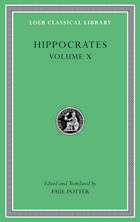
The definitive English edition of the “Father of Medicine.”
This is the tenth volume in the Loeb Classical Library’s ongoing edition of Hippocrates’ invaluable texts, which provide essential information about the practice of medicine in antiquity and about Greek theories concerning the human body. Here, Paul Potter presents the Greek text with facing English translation of five treatises, four concerning human reproduction (Generation, Nature of the Child) and reproductive disorders (Nature of Women, Barrenness), and one (Diseases 4) that expounds a general theory of physiology and pathology.
The works available in the Loeb Classical Library edition of Hippocrates are:
Volume I: Ancient Medicine. Airs, Waters, Places. Epidemics 1 and 3. The Oath. Precepts. Nutriment.
Volume II: Prognostic. Regimen in Acute Diseases. The Sacred Disease. The Art. Breaths. Law. Decorum. Dentition.
Volume III: On Wounds in the Head. In the Surgery. On Fractures. On Joints. Mochlicon.
Volume IV: Nature of Man. Regimen in Health. Humors. Aphorisms. Regimen 1–3. Dreams.
Volume V: Affections. Diseases 1–2.
Volume VI: Diseases 3. Internal Affections. Regimen in Acute Diseases.
Volume VII: Epidemics 2 and 4–7.
Volume VIII: Places in Man. Glands. Fleshes. Prorrhetic 1–2. Physician. Use of Liquids. Ulcers. Haemorrhoids and Fistulas.
Volume IX: Anatomy. Nature of Bones. Heart. Eight Months’ Child. Coan Prenotions. Crises. Critical Days. Superfetation. Girls. Excision of the Fetus. Sight.
Volume X: Generation. Nature of the Child. Diseases 4. Nature of Women. Barrenness.
Volume XI: Diseases of Women 1–2.

The definitive English edition of the “Father of Medicine.”
This is the eleventh and final volume in the Loeb Classical Library’s complete edition of Hippocrates’ invaluable texts, which provide essential information about the practice of medicine in antiquity and about Greek theories concerning the human body. Here, Paul Potter presents the Greek text with facing English translation of Diseases of Women 1 and 2, which represent the most extensive accounts in the Hippocratic collection of female reproductive life, the pathological conditions affecting the female reproductive organs, and their proper terminology and recommended treatments. A lexicon of therapeutic agents is included for reference.
The works available in the Loeb Classical Library edition of Hippocrates are:
Volume I: Ancient Medicine. Airs, Waters, Places. Epidemics 1 and 3. The Oath. Precepts. Nutriment.
Volume II: Prognostic. Regimen in Acute Diseases. The Sacred Disease. The Art. Breaths. Law. Decorum. Dentition.
Volume III: On Wounds in the Head. In the Surgery. On Fractures. On Joints. Mochlicon.
Volume IV: Nature of Man. Regimen in Health. Humors. Aphorisms. Regimen 1–3. Dreams.
Volume V: Affections. Diseases 1–2.
Volume VI: Diseases 3. Internal Affections. Regimen in Acute Diseases.
Volume VII: Epidemics 2 and 4–7.
Volume VIII: Places in Man. Glands. Fleshes. Prorrhetic 1–2. Physician. Use of Liquids. Ulcers. Haemorrhoids and Fistulas.
Volume IX: Anatomy. Nature of Bones. Heart. Eight Months’ Child. Coan Prenotions. Crises. Critical Days. Superfetation. Girls. Excision of the Fetus. Sight.
Volume X: Generation. Nature of the Child. Diseases 4. Nature of Women. Barrenness.
Volume XI: Diseases of Women 1–2.

This book is about the Homeric figure Nestor. This study is important because it reveals a level of deliberate irony in the Homeric poems that has hitherto not been suspected, and because Nestor’s role in the poems, which is built on this irony, is a key to the circumstances of the poems’ composition.
Nestor’s stories about the past, especially his own youth, often lack purpose on the surface of the poems, but with a slight shift of focus they provide a deep commentary on the present action of both poems. Nestor’s Homeric epithet, hippota, “the horseman,” permits the necessary refocus. The combination of epithet and name, hippota Nestor, has Indo-European roots, as a comparison with Vedic Sanskrit shows. Interpreted in the context of the Indo-European twin myth, Nestor’s role clearly points beyond itself to the key question in Homeric studies: the circumstances of the poems’ composition.
Nestor has a special relation to Ionia, where the Homeric poems were composed, and through Ionia to early Athens. The relationship between the Ionian city of Miletus and early Athens is particularly important. In addition to the role of these cities, the location of Nestor’s city Pylos, an ancient conundrum, is sharply illuminated by this new interpretation of Nestor’s Homeric role.

March of the emperors.
The Historia Augusta is a biographical work roughly following the model of the imperial biographer Suetonius (LCL 31, 38) and covering the lives of the Roman emperors from Hadrian (r. 117–138) to Carinus (r. 283–285), with a lacuna between the lives of the Gordians and the Valerians. Although the work comes down to us as a collection of thirty books written by six different authors, it is now generally considered to be the creation of a single individual writing under several pseudonyms no earlier than the late fourth century. It is a thoroughly enigmatic work whose origins, nature, and purpose remain obscure; the very beginning of the life of Hadrian is lost, and with it any general introduction that may have existed.
While the Historia Augusta is our most detailed surviving source for the second and third centuries, often providing details beyond the Greek accounts, it is not a trustworthy source for historical information: too many of the details are anachronistic, unsupported, or preposterous, or contradicted internally or by better sources, and many documents, speeches, acclamations, and inscriptions that it quotes or cites are entirely fictional.
The Historia Augusta nevertheless has its attractions: for the connoisseur of biography the author provides plenty of wordplay, puns, allusions, literary games, and mock-scholarly digressions, and for the casual reader he offers vivid characterizations of emperors both good and bad.
This revision of the original Loeb edition by David Magie offers text, translation, and annotation that are fully current with modern scholarship.

The Scriptores Historiae Augustae, or Historia Augusta, is a collection of biographies of Roman emperors, heirs, and claimants from Hadrian to Numerianus (117–284 CE). The work, which is modeled on Suetonius, purports to be written by six different authors and quotes documents and public records extensively. Since we possess no continuous account of the emperors of the second and third centuries, the Historia Augusta has naturally attracted keen attention. In the last century it has also generated the gravest suspicions. Present opinion holds that the whole is the work of a single author (who lived in the time of Theodosius) and contains much that is plagiarism and even downright forgery.
The Loeb Classical Library edition of the Historia Augusta is in three volumes.

March of the emperors.
The Historia Augusta is a biographical work roughly following the model of the imperial biographer Suetonius (LCL 31, 38) and covering the lives of the Roman emperors from Hadrian (r. 117–138) to Carinus (r. 283–285), with a lacuna between the lives of the Gordians and the Valerians. Although the work comes down to us as a collection of thirty books written by six different authors, it is now generally considered to be the creation of a single individual writing under several pseudonyms no earlier than the late fourth century. It is a thoroughly enigmatic work whose origins, nature, and purpose remain obscure; the very beginning of the life of Hadrian is lost, and with it any general introduction that may have existed.
While the Historia Augusta is our most detailed surviving source for the second and third centuries, often providing details beyond the Greek accounts, it is not a trustworthy source for historical information: too many of the details are anachronistic, unsupported, or preposterous, or contradicted internally or by better sources, and many documents, speeches, acclamations, and inscriptions that it quotes or cites are entirely fictional.
The Historia Augusta nevertheless has its attractions: for the connoisseur of biography the author provides plenty of wordplay, puns, allusions, literary games, and mock-scholarly digressions, and for the casual reader he offers vivid characterizations of emperors both good and bad.
This revision of the original Loeb edition by David Magie offers text, translation, and annotation that are fully current with modern scholarship.

The Scriptores Historiae Augustae, or Historia Augusta, is a collection of biographies of Roman emperors, heirs, and claimants from Hadrian to Numerianus (117–284 CE). The work, which is modeled on Suetonius, purports to be written by six different authors and quotes documents and public records extensively. Since we possess no continuous account of the emperors of the second and third centuries, the Historia Augusta has naturally attracted keen attention. In the last century it has also generated the gravest suspicions. Present opinion holds that the whole is the work of a single author (who lived in the time of Theodosius) and contains much that is plagiarism and even downright forgery.
The Loeb Classical Library edition of the Historia Augusta is in three volumes.

March of the emperors.
The Historia Augusta is a biographical work roughly following the model of the imperial biographer Suetonius (LCL 31, 38) and covering the lives of the Roman emperors from Hadrian (r. 117–138) to Carinus (r. 283–285), with a lacuna between the lives of the Gordians and the Valerians. Although the work comes down to us as a collection of thirty books written by six different authors, it is now generally considered to be the creation of a single individual writing under several pseudonyms no earlier than the late fourth century. It is a thoroughly enigmatic work whose origins, nature, and purpose remain obscure; the very beginning of the life of Hadrian is lost, and with it any general introduction that may have existed.
While the Historia Augusta is our most detailed surviving source for the second and third centuries, often providing details beyond the Greek accounts, it is not a trustworthy source for historical information: too many of the details are anachronistic, unsupported, or preposterous, or contradicted internally or by better sources, and many documents, speeches, acclamations, and inscriptions that it quotes or cites are entirely fictional.
The Historia Augusta nevertheless has its attractions: for the connoisseur of biography the author provides plenty of wordplay, puns, allusions, literary games, and mock-scholarly digressions, and for the casual reader he offers vivid characterizations of emperors both good and bad.
This revision of the original Loeb edition by David Magie offers text, translation, and annotation that are fully current with modern scholarship.

The Scriptores Historiae Augustae, or Historia Augusta, is a collection of biographies of Roman emperors, heirs, and claimants from Hadrian to Numerianus (117 284 CE). The work, which is modeled on Suetonius, purports to be written by six different authors and quotes documents and public records extensively. Since we possess no continuous account of the emperors of the second and third centuries, the Historia Augusta has naturally attracted keen attention. In the last century it has also generated the gravest suspicions. Present opinion holds that the whole is the work of a single author (who lived in the time of Theodosius) and contains much that is plagiarism and even downright forgery.
The Loeb Classical Library edition of the Historia Augusta is in three volumes.

A literary cabinet of curiosities.
Aelian’s Historical Miscellany is a pleasurable example of light reading for Romans of the early third century. Offering engaging anecdotes about historical figures, retellings of legendary events, and enjoyable descriptive pieces—in sum: amusement, information, and variety—Aelian’s collection of nuggets and narratives could be enjoyed by a wide reading public. A rather similar book had been published in Latin in the previous century by Aulus Gellius; Aelian is a late, perhaps the last, representative of what had been a very popular genre.
Here then are anecdotes about the famous Greek philosophers, poets, historians, and playwrights; myths instructively retold; moralizing tales about heroes and rulers, athletes and wise men; reports about styles in dress, food and drink, lovers, gift-giving practices, entertainments, religious beliefs and death customs; and comments on Greek painting. Some of the information is not preserved in any other source. Underlying it all are Aelian’s Stoic ideals as well as this Roman’s great admiration for the culture of the Greeks (whose language he borrowed for his writings).
The Historical Miscellany is now added to the Loeb Classical Library, the Greek text facing a skillful and helpfully annotated new translation by Nigel Wilson. In his trenchant Introduction he discusses the literary genre of Aelian’s miscellany, its style and historical setting.

The paramount historian of the early Roman empire.
Tacitus (Cornelius), famous Roman historian, was born in AD 55, 56 or 57 and lived to about 120. He became an orator, married in 77 a daughter of Julius Agricola before Agricola went to Britain, was quaestor in 81 or 82, a senator under the Flavian emperors, and a praetor in 88. After four years’ absence he experienced the terrors of Emperor Domitian’s last years and turned to historical writing. He was a consul in 97. Close friend of the younger Pliny, with him he successfully prosecuted Marius Priscus.
Works: (i) Life and Character of Agricola, written in 97–98, specially interesting because of Agricola’s career in Britain. (ii) Germania (98–99), an equally important description of the geography, anthropology, products, institutions, and social life and the tribes of the Germans as known to the Romans. (iii) Dialogue on Oratory (Dialogus), of unknown date; a lively conversation about the decline of oratory and education. (iv) Histories (probably issued in parts from 105 onwards), a great work originally consisting of at least twelve books covering the period AD 69–96, but only Books 1–4 and part of Book 5 survive, dealing in detail with the dramatic years 69–70. (v) Annals, Tacitus’s other great work, originally covering the period AD 14–68 (Emperors Tiberius, Gaius, Claudius, Nero) and published between 115 and about 120. Of sixteen books at least, there survive Books 1–4 (covering the years 14–28); a bit of Book 5 and all Book 6 (31–37); part of Book 11 (from 47); Books 12–15 and part of Book 16 (to 66).
Tacitus is renowned for his development of a pregnant concise style, character study, and psychological analysis, and for the often terrible story which he brilliantly tells. As a historian of the early Roman empire he is paramount.
The Loeb Classical Library edition of Tacitus is in five volumes.

The paramount historian of the early Roman empire.
Tacitus (Cornelius), famous Roman historian, was born in AD 55, 56 or 57 and lived to about 120. He became an orator, married in 77 a daughter of Julius Agricola before Agricola went to Britain, was quaestor in 81 or 82, a senator under the Flavian emperors, and a praetor in 88. After four years’ absence he experienced the terrors of Emperor Domitian’s last years and turned to historical writing. He was a consul in 97. Close friend of the younger Pliny, with him he successfully prosecuted Marius Priscus.
Works: (i) Life and Character of Agricola, written in 97–98, specially interesting because of Agricola’s career in Britain. (ii) Germania (98–99), an equally important description of the geography, anthropology, products, institutions, and social life and the tribes of the Germans as known to the Romans. (iii) Dialogue on Oratory (Dialogus), of unknown date; a lively conversation about the decline of oratory and education. (iv) Histories (probably issued in parts from 105 onwards), a great work originally consisting of at least twelve books covering the period AD 69–96, but only Books 1–4 and part of Book 5 survive, dealing in detail with the dramatic years 69–70. (v) Annals, Tacitus’s other great work, originally covering the period AD 14–68 (Emperors Tiberius, Gaius, Claudius, Nero) and published between 115 and about 120. Of sixteen books at least, there survive Books 1–4 (covering the years 14–28); a bit of Book 5 and all Book 6 (31–37); part of Book 11 (from 47); Books 12–15 and part of Book 16 (to 66).
Tacitus is renowned for his development of a pregnant concise style, character study, and psychological analysis, and for the often terrible story which he brilliantly tells. As a historian of the early Roman empire he is paramount.
The Loeb Classical Library edition of Tacitus is in five volumes.

Hellenistic history.
The historian Polybius (ca. 200–118 BC) was born into a leading family of Megalopolis in the Peloponnese (Morea) and served the Achaean League in arms and diplomacy for many years, favoring alliance with Rome. From 168 to 151 he was held hostage in Rome, where he became a friend of Lucius Aemilius Paulus and his two sons, especially Scipio Aemilianus, whose campaigns, including the destruction of Carthage, he later attended. Late in his life he became a trusted mediator between Greece and the Romans; helped in the discussions that preceded the final war with Carthage; and after 146 was entrusted by the Romans with the details of administration in Greece.
Polybius’ overall theme is how and why the Romans spread their power as they did. The main part of his history covers the years 264–146 BC, describing the rise of Rome, her destruction of Carthage, and her eventual domination of the Greek world. It is a great work: accurate, thoughtful, largely impartial, based on research, and full of insight into customs, institutions, geography, the causes of events, and the character of peoples. It is a vital achievement of the first importance despite the incomplete state in which all but the first five of its original forty books have reached us.
For this edition, W. R. Paton’s excellent translation, first published in 1922, has been thoroughly revised, the Büttner-Wobst Greek text corrected, and explanatory notes and a new introduction added, all reflecting the latest scholarship.
The Loeb Classical Library edition of Polybius is in six volumes.

Polybius (born ca. 208 BCE) of Megalopolis in the Peloponnese (Morea), served the Achaean League in arms and diplomacy for many years, favouring alliance with Rome. From 168 to 151 he was hostage in Rome where he became a friend of Aemilius Paulus and his two sons, and especially adopted Scipio Aemilianus whose campaigns he attended later. In late life he was trusted mediator between Greece and the Romans whom he admired; helped in the discussions which preceded the final war with Carthage; and, after 146, was entrusted by the Romans with details of administration in Greece. He died at the age of 82 after a fall from his horse.
The main part of Polybius's history covers the years 264146 BCE. It describes the rise of Rome to the destruction of Carthage and the domination of Greece by Rome. It is a great work, accurate, thoughtful, largely impartial, based on research, full of insight into customs, institutions, geography, causes of events and character of people; it is a vital achievement of first rate importance, despite the incomplete state in which all but the first five of the forty books have reached us. Polybius's overall theme is how and why the Romans spread their power as they did.
The Loeb Classical Library edition of Polybius is in six volumes.

Hellenistic history.
The historian Polybius (ca. 200–118 BC) was born into a leading family of Megalopolis in the Peloponnese (Morea) and served the Achaean League in arms and diplomacy for many years, favoring alliance with Rome. From 168 to 151 he was held hostage in Rome, where he became a friend of Lucius Aemilius Paulus and his two sons, especially Scipio Aemilianus, whose campaigns, including the destruction of Carthage, he later attended. Late in his life he became a trusted mediator between Greece and the Romans; helped in the discussions that preceded the final war with Carthage; and after 146 was entrusted by the Romans with the details of administration in Greece.
Polybius’ overall theme is how and why the Romans spread their power as they did. The main part of his history covers the years 264–146 BC, describing the rise of Rome, her destruction of Carthage, and her eventual domination of the Greek world. It is a great work: accurate, thoughtful, largely impartial, based on research, and full of insight into customs, institutions, geography, the causes of events, and the character of peoples. It is a vital achievement of the first importance despite the incomplete state in which all but the first five of its original forty books have reached us.
For this edition, W. R. Paton’s excellent translation, first published in 1922, has been thoroughly revised, the Büttner-Wobst Greek text corrected, and explanatory notes and a new introduction added, all reflecting the latest scholarship.
The Loeb Classical Library edition of Polybius is in six volumes.

Polybius (born ca. 208 BCE) of Megalopolis in the Peloponnese (Morea), served the Achaean League in arms and diplomacy for many years, favouring alliance with Rome. From 168 to 151 he was hostage in Rome where he became a friend of Aemilius Paulus and his two sons, and especially adopted Scipio Aemilianus whose campaigns he attended later. In late life he was trusted mediator between Greece and the Romans whom he admired; helped in the discussions which preceded the final war with Carthage; and, after 146, was entrusted by the Romans with details of administration in Greece. He died at the age of 82 after a fall from his horse.
The main part of Polybius's history covers the years 264146 BCE. It describes the rise of Rome to the destruction of Carthage and the domination of Greece by Rome. It is a great work, accurate, thoughtful, largely impartial, based on research, full of insight into customs, institutions, geography, causes of events and character of people; it is a vital achievement of first rate importance, despite the incomplete state in which all but the first five of the forty books have reached us. Polybius's overall theme is how and why the Romans spread their power as they did.
The Loeb Classical Library edition of Polybius is in six volumes.
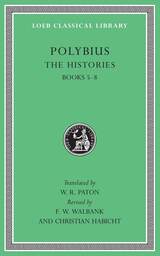
Hellenistic history.
The historian Polybius (ca. 200–118 BC) was born into a leading family of Megalopolis in the Peloponnese (Morea) and served the Achaean League in arms and diplomacy for many years, favoring alliance with Rome. From 168 to 151 he was held hostage in Rome, where he became a friend of Lucius Aemilius Paulus and his two sons, especially Scipio Aemilianus, whose campaigns, including the destruction of Carthage, he later attended. Late in his life he became a trusted mediator between Greece and the Romans; helped in the discussions that preceded the final war with Carthage; and after 146 was entrusted by the Romans with the details of administration in Greece.
Polybius’ overall theme is how and why the Romans spread their power as they did. The main part of his history covers the years 264–146 BC, describing the rise of Rome, her destruction of Carthage, and her eventual domination of the Greek world. It is a great work: accurate, thoughtful, largely impartial, based on research, and full of insight into customs, institutions, geography, the causes of events, and the character of peoples. It is a vital achievement of the first importance despite the incomplete state in which all but the first five of its original forty books have reached us.
For this edition, W. R. Paton’s excellent translation, first published in 1922, has been thoroughly revised, the Büttner-Wobst Greek text corrected, and explanatory notes and a new introduction added, all reflecting the latest scholarship.
The Loeb Classical Library edition of Polybius is in six volumes.

Polybius (born ca. 208 BCE) of Megalopolis in the Peloponnese (Morea), served the Achaean League in arms and diplomacy for many years, favouring alliance with Rome. From 168 to 151 he was hostage in Rome where he became a friend of Aemilius Paulus and his two sons, and especially adopted Scipio Aemilianus whose campaigns he attended later. In late life he was trusted mediator between Greece and the Romans whom he admired; helped in the discussions which preceded the final war with Carthage; and, after 146, was entrusted by the Romans with details of administration in Greece. He died at the age of 82 after a fall from his horse.
The main part of Polybius's history covers the years 264146 BCE. It describes the rise of Rome to the destruction of Carthage and the domination of Greece by Rome. It is a great work, accurate, thoughtful, largely impartial, based on research, full of insight into customs, institutions, geography, causes of events and character of people; it is a vital achievement of first rate importance, despite the incomplete state in which all but the first five of the forty books have reached us. Polybius's overall theme is how and why the Romans spread their power as they did.
The Loeb Classical Library edition of Polybius is in six volumes.
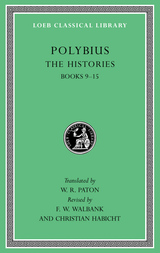
Hellenistic history.
The historian Polybius (ca. 200–118 BC) was born into a leading family of Megalopolis in the Peloponnese (Morea) and served the Achaean League in arms and diplomacy for many years, favoring alliance with Rome. From 168 to 151 he was held hostage in Rome, where he became a friend of Lucius Aemilius Paulus and his two sons, especially Scipio Aemilianus, whose campaigns, including the destruction of Carthage, he later attended. Late in his life he became a trusted mediator between Greece and the Romans; helped in the discussions that preceded the final war with Carthage; and after 146 was entrusted by the Romans with the details of administration in Greece.
Polybius’ overall theme is how and why the Romans spread their power as they did. The main part of his history covers the years 264–146 BC, describing the rise of Rome, her destruction of Carthage, and her eventual domination of the Greek world. It is a great work: accurate, thoughtful, largely impartial, based on research, and full of insight into customs, institutions, geography, the causes of events, and the character of peoples. It is a vital achievement of the first importance despite the incomplete state in which all but the first five of its original forty books have reached us.
For this edition, W. R. Paton’s excellent translation, first published in 1922, has been thoroughly revised, the Büttner-Wobst Greek text corrected, and explanatory notes and a new introduction added, all reflecting the latest scholarship.
The Loeb Classical Library edition of Polybius is in six volumes.

Polybius (born ca. 208 BCE) of Megalopolis in the Peloponnese (Morea), served the Achaean League in arms and diplomacy for many years, favouring alliance with Rome. From 168 to 151 he was hostage in Rome where he became a friend of Aemilius Paulus and his two sons, and especially adopted Scipio Aemilianus whose campaigns he attended later. In late life he was trusted mediator between Greece and the Romans whom he admired; helped in the discussions which preceded the final war with Carthage; and, after 146, was entrusted by the Romans with details of administration in Greece. He died at the age of 82 after a fall from his horse.
The main part of Polybius's history covers the years 264146 BCE. It describes the rise of Rome to the destruction of Carthage and the domination of Greece by Rome. It is a great work, accurate, thoughtful, largely impartial, based on research, full of insight into customs, institutions, geography, causes of events and character of people; it is a vital achievement of first rate importance, despite the incomplete state in which all but the first five of the forty books have reached us. Polybius's overall theme is how and why the Romans spread their power as they did.
The Loeb Classical Library edition of Polybius is in six volumes.
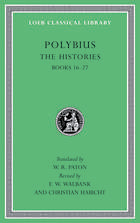
Hellenistic history.
The historian Polybius (ca. 200–118 BC) was born into a leading family of Megalopolis in the Peloponnese (Morea) and served the Achaean League in arms and diplomacy for many years, favoring alliance with Rome. From 168 to 151 he was held hostage in Rome, where he became a friend of Lucius Aemilius Paulus and his two sons, especially Scipio Aemilianus, whose campaigns, including the destruction of Carthage, he later attended. Late in his life he became a trusted mediator between Greece and the Romans; helped in the discussions that preceded the final war with Carthage; and after 146 was entrusted by the Romans with the details of administration in Greece.
Polybius’ overall theme is how and why the Romans spread their power as they did. The main part of his history covers the years 264–146 BC, describing the rise of Rome, her destruction of Carthage, and her eventual domination of the Greek world. It is a great work: accurate, thoughtful, largely impartial, based on research, and full of insight into customs, institutions, geography, the causes of events, and the character of peoples. It is a vital achievement of the first importance despite the incomplete state in which all but the first five of its original forty books have reached us.
For this edition, W. R. Paton’s excellent translation, first published in 1922, has been thoroughly revised, the Büttner-Wobst Greek text corrected, and explanatory notes and a new introduction added, all reflecting the latest scholarship.
The Loeb Classical Library edition of Polybius is in six volumes.

Polybius (born ca. 208 BCE) of Megalopolis in the Peloponnese (Morea), served the Achaean League in arms and diplomacy for many years, favouring alliance with Rome. From 168 to 151 he was hostage in Rome where he became a friend of Aemilius Paulus and his two sons, and especially adopted Scipio Aemilianus whose campaigns he attended later. In late life he was trusted mediator between Greece and the Romans whom he admired; helped in the discussions which preceded the final war with Carthage; and, after 146, was entrusted by the Romans with details of administration in Greece. He died at the age of 82 after a fall from his horse.
The main part of Polybius's history covers the years 264146 BCE. It describes the rise of Rome to the destruction of Carthage and the domination of Greece by Rome. It is a great work, accurate, thoughtful, largely impartial, based on research, full of insight into customs, institutions, geography, causes of events and character of people; it is a vital achievement of first rate importance, despite the incomplete state in which all but the first five of the forty books have reached us. Polybius's overall theme is how and why the Romans spread their power as they did.
The Loeb Classical Library edition of Polybius is in six volumes.

Polybius (born ca. 208 BCE) of Megalopolis in the Peloponnese (Morea), served the Achaean League in arms and diplomacy for many years, favouring alliance with Rome. From 168 to 151 he was hostage in Rome where he became a friend of Aemilius Paulus and his two sons, and especially adopted Scipio Aemilianus whose campaigns he attended later. In late life he was trusted mediator between Greece and the Romans whom he admired; helped in the discussions which preceded the final war with Carthage; and, after 146, was entrusted by the Romans with details of administration in Greece. He died at the age of 82 after a fall from his horse.
The main part of Polybius's history covers the years 264146 BCE. It describes the rise of Rome to the destruction of Carthage and the domination of Greece by Rome. It is a great work, accurate, thoughtful, largely impartial, based on research, full of insight into customs, institutions, geography, causes of events and character of people; it is a vital achievement of first rate importance, despite the incomplete state in which all but the first five of the forty books have reached us. Polybius's overall theme is how and why the Romans spread their power as they did.
The Loeb Classical Library edition of Polybius is in six volumes.
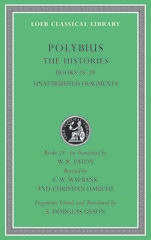
Hellenistic history.
The historian Polybius (ca. 200–118 BC) was born into a leading family of Megalopolis in the Peloponnese (Morea) and served the Achaean League in arms and diplomacy for many years, favoring alliance with Rome. From 168 to 151 he was held hostage in Rome, where he became a friend of Lucius Aemilius Paulus and his two sons, especially Scipio Aemilianus, whose campaigns, including the destruction of Carthage, he later attended. Late in his life he became a trusted mediator between Greece and the Romans; helped in the discussions that preceded the final war with Carthage; and after 146 was entrusted by the Romans with the details of administration in Greece.
Polybius’ overall theme is how and why the Romans spread their power as they did. The main part of his history covers the years 264–146 BC, describing the rise of Rome, her destruction of Carthage, and her eventual domination of the Greek world. It is a great work: accurate, thoughtful, largely impartial, based on research, and full of insight into customs, institutions, geography, the causes of events, and the character of peoples. It is a vital achievement of the first importance despite the incomplete state in which all but the first five of its original forty books have reached us.
For this edition, W. R. Paton’s excellent translation, first published in 1922, has been thoroughly revised, the Büttner-Wobst Greek text corrected, and explanatory notes and a new introduction added, all reflecting the latest scholarship.
The Loeb Classical Library edition of Polybius is in six volumes.
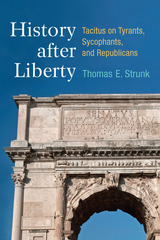
History after Liberty explores Tacitus’ political thought through his understanding of liberty. Influenced by modern republican writers such as Quentin Skinner and Philip Pettit, this study defines Tacitean libertas as the freedom from the rule of a dominus and as freedom to participate in the traditional politics of Rome through military service, public service in the senate and magistracies, and public speech. All of these elements are balanced in Tacitus’ writings with examples of those resisting the corruption of politics in an effort to restore a sense of free civic engagement. The work concludes with an exploration of Tacitus’ own writings as an act of restoring liberty. In contrast to most studies on Tacitus, History after Liberty argues that Tacitus is a republican who writes both to demonstrate that Rome had become a tyranny and to show a way out of that tyranny.
History after Liberty addresses the political thought of Tacitus’ writings. As such it will be of most interest to those who study the history and historiography of the early Roman empire, namely classicists and ancient historians. The work will also be of use to those interested in the antecedents to modern political thought, particularly the history of republicanism and freedom; readers from this category will include political scientists, philosophers, and modern historians.

Adventurous history.
Quintus Curtius was apparently a rhetorician who lived in the first century of the Roman empire and, early in the reign of Claudius (AD 41–54), wrote a history of Alexander the Great in ten books in clear and picturesque style for Latin readers. The first two books have not survived—our narrative begins with events in 333 BC—and there is material missing from books 5, 6, and 10. One of his main sources is Cleitarchus who, about 300 BC, had made Alexander’s career a matter of marvelous adventure.
Curtius is not a critical historian; and in his desire to entertain and to stress the personality of Alexander, he elaborates effective scenes, omits much that is important for history, and does not worry about chronology. But he does not invent things, except speeches and letters inserted into the narrative by traditional habit. “I copy more than I believe,” he says. Three features of his story are narrative of exciting experiences, development of a hero’s character, and a disposition to moralize. His history is one of the five extant works on which we rely for the career of Alexander the Great.
The Loeb Classical Library edition of Quintus Curtius is in two volumes.
READERS
Browse our collection.
PUBLISHERS
See BiblioVault's publisher services.
STUDENT SERVICES
Files for college accessibility offices.
UChicago Accessibility Resources
home | accessibility | search | about | contact us
BiblioVault ® 2001 - 2024
The University of Chicago Press









